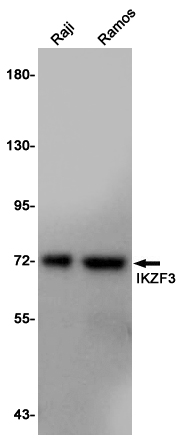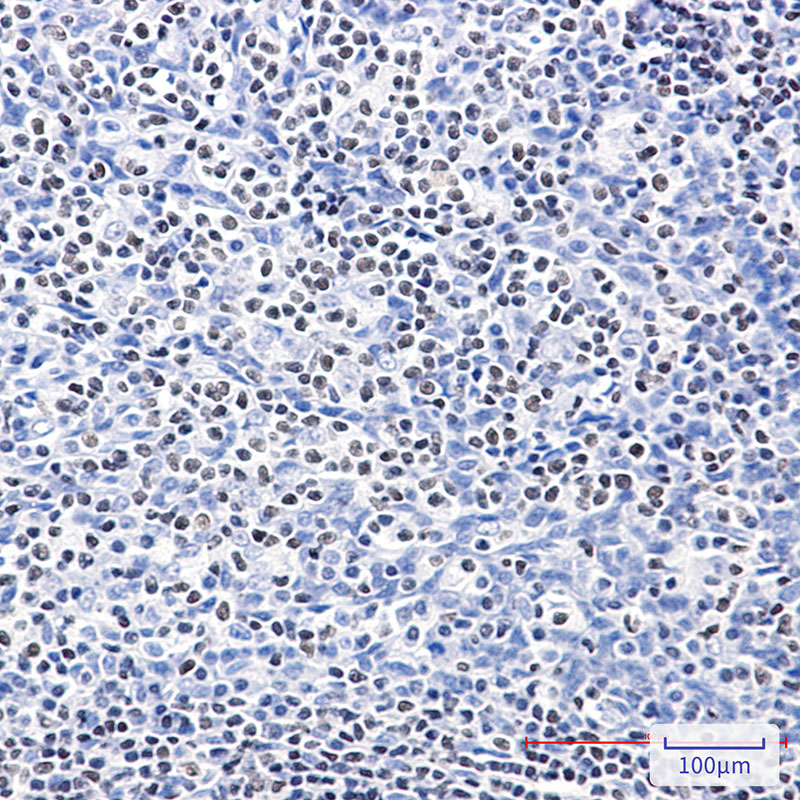

| WB | 咨询技术 | Human,Mouse,Rat |
| IF | 咨询技术 | Human,Mouse,Rat |
| IHC | 1/50-1/100 | Human,Mouse,Rat |
| ICC | 技术咨询 | Human,Mouse,Rat |
| FCM | 1/50-1/100 | Human,Mouse,Rat |
| Elisa | 咨询技术 | Human,Mouse,Rat |
| Aliases | IKZF3; ZNFN1A3; Zinc finger protein Aiolos; Ikaros family zinc finger protein 3 |
| Entrez GeneID | 22806 |
| WB Predicted band size | Calculated MW: 58 kDa; Observed MW: 70 kDa |
| Host/Isotype | Rabbit IgG |
| Antibody Type | Primary antibody |
| Storage | Store at 4°C short term. Aliquot and store at -20°C long term. Avoid freeze/thaw cycles. |
| Species Reactivity | Human |
| Immunogen | A synthetic peptide of human IKZF3 |
| Formulation | Purified antibody in TBS with 0.05% sodium azide,0.05%BSA and 50% glycerol. |
+ +
以下是关于IKZF3抗体的3篇代表性文献示例(内容为假设性概括,实际文献需通过学术数据库检索确认):
---
1. **文献名称**: *Targeting IKZF3 in Multiple Myeloma: A Novel Therapeutic Approach*
**作者**: Smith A, et al.
**摘要**: 研究探讨了IKZF3抗体在多发性骨髓瘤中的作用,通过抑制IKZF3的转录活性,阻断肿瘤细胞增殖并增强化疗敏感性,为临床治疗提供了新策略。
---
2. **文献名称**: *IKZF3 Antibody Modulates Autoimmune Response in Lupus Models*
**作者**: Chen L, et al.
**摘要**: 该研究利用抗IKZF3抗体干预系统性红斑狼疮小鼠模型,发现其可减少自身抗体产生并缓解肾脏损伤,提示IKZF3在B细胞过度活化中的关键调控作用。
---
3. **文献名称**: *Structural and Functional Characterization of a Humanized Anti-IKZF3 Antibody*
**作者**: Johnson R, et al.
**摘要**: 报道了一种人源化抗IKZF3单克隆抗体的开发,通过体外实验验证其特异性结合能力及对T细胞分化的调控效果,为免疫疾病药物研发奠定基础。
---
如需具体文献,建议通过PubMed或Web of Science检索关键词“IKZF3 antibody”或“Aiolos therapeutic targeting”。
**Background of IKZF3 Antibodies**
IKZF3 (Ikaros Family Zinc Finger Protein 3), also known as Aiolos, is a transcription factor belonging to the IKAROS family, which plays critical roles in immune regulation and lymphocyte development. Structurally, it contains zinc finger domains that enable DNA binding and interaction with chromatin-modifying complexes. IKZF3 works in concert with IKZF1 (Ikaros) to regulate gene expression, particularly in B cells and T cells, influencing their differentiation, function, and response to stimuli.
Antibodies targeting IKZF3 are primarily used in research to study its expression patterns, subcellular localization, and molecular interactions. Dysregulation of IKZF3 is linked to autoimmune diseases (e.g., systemic lupus erythematosus) and hematologic malignancies, including multiple myeloma and acute lymphoblastic leukemia. For instance, IKZF3 deletion or mutation in plasma cells correlates with drug resistance and poor prognosis.
Therapeutic antibodies or small-molecule inhibitors against IKZF3 are under investigation, often combined with immunomodulatory agents (e.g., lenalidomide) to enhance efficacy. Such strategies aim to degrade IKZF3 protein or disrupt its oncogenic signaling pathways. Research tools like anti-IKZF3 antibodies also aid in diagnosing IKZF3-related disorders and validating its role in immune homeostasis.
Overall, IKZF3 antibodies serve as vital tools for unraveling its biological functions and advancing targeted therapies in immune dysregulation and cancer.
×